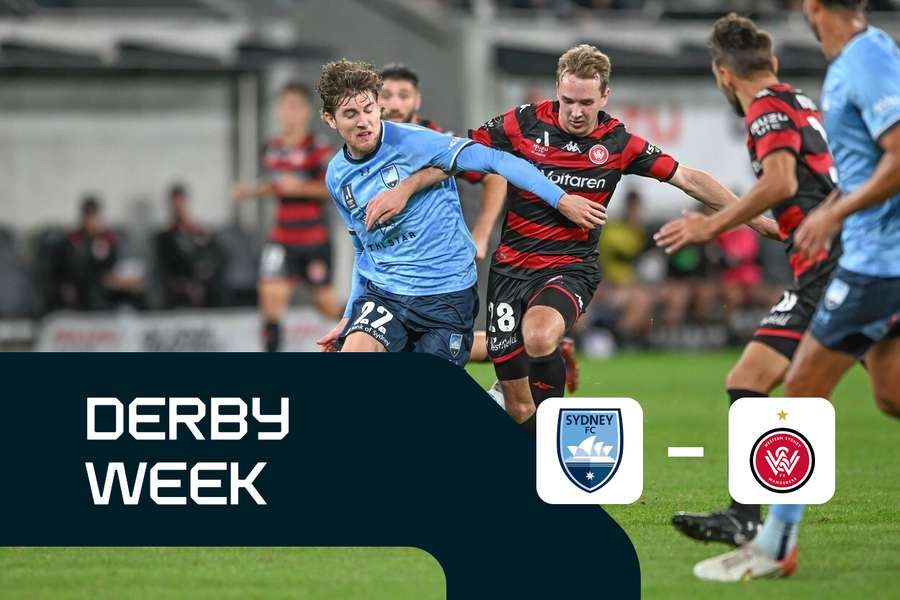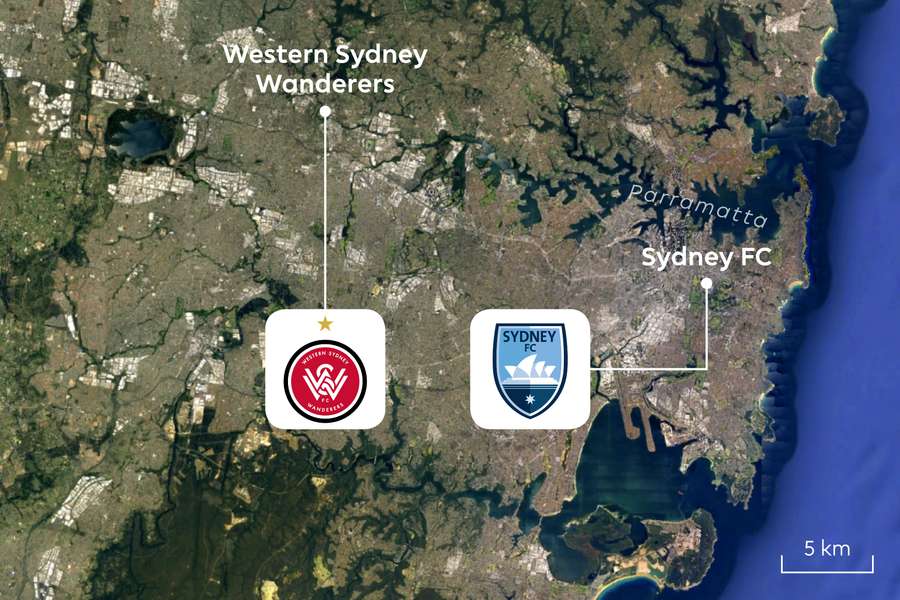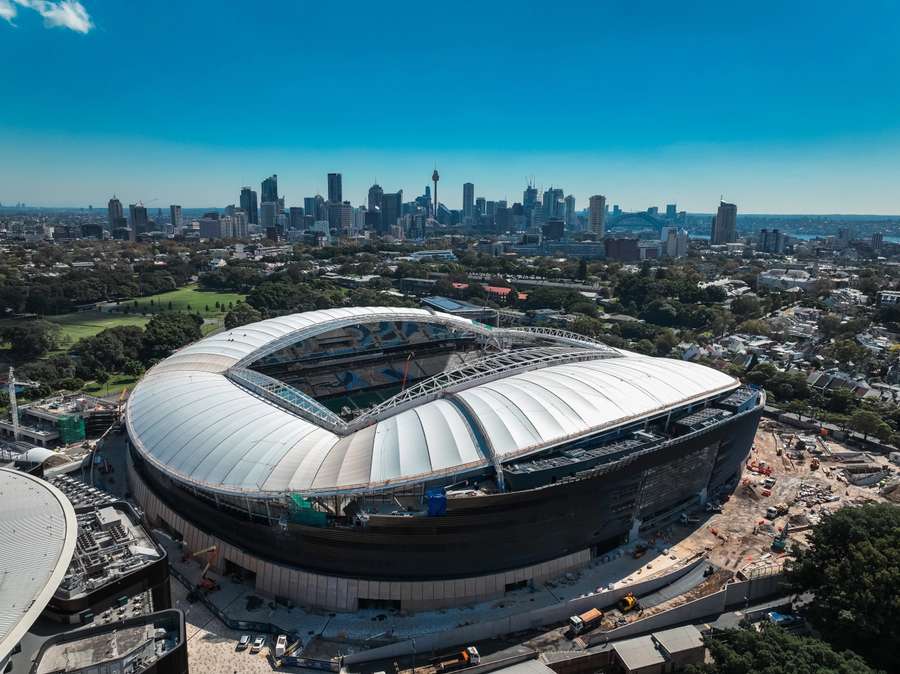Derby Week: Sydney FC and Western Sydney Wanderers ready to battle for city

The A-League, the elite counter-party football competition that currently features a New Zealand representative (Wellington Phoenix) alongside 11 Australian teams, began making history with the 2005/06 season. Among the founding members was Sydney FC, who were also its first winner. The Sky Blues, as it is nicknamed after the club colours, later won four more championship titles. To this end, it is the most successful team in the competition and the historical number one in Australia.
City rival Western Sydney Wanderers was only founded in 2012. Until then, Sydney FC had a monopoly on football in the city, literally. When the A-League was established, it reached an exclusivity agreement with the competition's management under the league's "one city, one team" policy, which prevented the establishment of another club based there. The agreement was in effect for a period of five years.
And while there were tendencies to form a local competitor, the path to the league was legislatively closed. This privileged status of the team already portended that Sydney itself (a metropolitan area of more than five million people) was not to everyone's liking. And because it had great potential for more than one club to operate there, a new one did indeed emerge after the agreed deadline.
West versus East
The name Western Sydney Wanderers already implies that the club is based in the western part of the city. The Wanderers were founded specifically to integrate and in some way uplift the society of Western Sydney.
It is this, along with the adjacent suburbs, that has the greatest cultural diversity within the whole of Australia. Many immigrants from all parts of the world are concentrated there.
Housing there is considerably cheaper than in other parts of the city. In contrast, Sydney FC's home is right in the centre, which is located to the east at the mouth of the Parramatta River and the seafront - the most lucrative area. One of the reasons for the great rivalry between the two rivals therefore lies in the socio-cultural differences between these parts of the city.

Residents of western Sydney did not find their way to the original Sydney clb even in the days when there was no other club in the city. The reason for this is that Sydney was originally intended to have its headquarters, its home stadium, in the west.
However, the club's owners soon moved the destination for matches to the aforementioned wealthier urban core. When the Western Sydney Wanderers were then formed, there was no doubt that they would quickly win the hearts of the vast majority of residents in western Sydney.
The two parts of the city and subsequently both clubs and their supporters despise each other. The residents of the west and the fans of that club are referred to by others as 'Westies', with a very noticeable pejorative tinge to the term. The intense tension and animosity between them has (since 2012) spilled over onto the football turf.
20,000 and Del Piero
Western Sydney entered the A-League in the 2012/13 season. The first derby came in October 2012, in the third round of the season. It was played at Parramatta Stadium, which was first briefly home to Sydney FC and which became the home of the new, local western Sydney club. Nearly 20,000 spectators watched the first derby from the stands.
Aside from the derby itself, the big event at the start of that league season was the signing of star Italian Alessandro Del Piero. He was lured to Australia by Sydney FC management after his glorious stint at Juventus, in a bit of a bid to divert attention away from their emerging city rival. By signing a world-class star (albeit at the end of his career), it wanted to bolster its image as a big and rich club.
The Italian striker was, after all, also present at the decisive moment of the first battle for Sydney. In the second half, he stood up to take a penalty kick. He scored, but the referee ordered a re-spot because Del Pier's teammate ran into the penalty area early. The second attempt was parried by the goalkeeper, but Del Piero managed to get the ball into the net from the rebound.
You might get the feeling from the derby story so far that this is a David versus Goliath match. The ratios and capabilities of the two clubs would fit that comparison, but the results do not. Western Sydney Wanderers have bounced back from their first derby defeat as they picked up their first win in the very next round, and eventually notched up 18 wins (out of 27 games) for the season.
A European-style derby
The Western Sydney 'Tramps'' spirited ride through their first league season earned them a regular season triumph. The A-League champion, however, is the winner of the subsequent play-off. The Wanderers eventually fell in the final. They more than proved that they are no pushover by winning the Asian Champions League in 2014, becoming the first, and so far only, Australian team to win the competition.
The Sydney derby has been attracting huge crowds (by Australian football standards) since the early days. These are aided by the fact that both teams are now based in beautiful and large stadiums. Western Sydney Wanderers have been playing at Western Sydney Stadium (under the commercial name CommBank Stadium) since 2019, with a capacity of 30,000 spectators, which stands on the site of the former Parramatta ground.
Sydney FC has also built a new arena - Sydney Football Stadium (aka Allianz Stadium) for 42,500 fans, which opened last year.
Aside from the sold-out stadiums, the large fanbases of both clubs are behind the great atmosphere of the Sydney derby. They are famous for their many chants and choreographies. Even Del Piero and other players with European experience have let it be known that the duel is equal to the fiercest matches of the best European competitions.

In the last six matches between them, the winner of the derby has regularly alternated: WSW - SFC - WSW - SFC - WSW - SFC. So it's the turn of Western Sydney Wanderers, who are currently in first place after four rounds of the A-League and haven't lost once. Sydney FC, however, are playing at home. Watch how the first Sydney derby of the 2023/24 season turns out on Flashscore. The match is scheduled to kick off at 09:45 CET on Saturday, November 25th.
Next derby of the week
Friday November 24th
Poland - I Liga (2nd League)
Tri-City Derby
Gdansk, Gdynia and Sopot together form the so-called Tri-City. Gdansk and Gdynia have two large clubs. Lechia Gdansk and Arka Gdynia traditionally compete in the top Polish league. However, the current "Tri-City derby" is a minor league match.
Saturday November 25th
Australia - A-League
Central Coast Mariners - Newcastle Jets
F3 Derby
In addition to the Sydney derby, there is one more football rivalry game on the schedule in Australia. The Newcastle Jets and the Central Coast Mariners will clash - the latter are based in Gosford, about 70 kilometres south of Newcastle and about the same distance north of Sydney. The derby takes its name from the highway that connects the three cities.
Northern Ireland - NIFL Premiership
North Belfast derby
The rivalry between the North Belfast clubs Crusaders and Cliftonville is rooted in an ethno-political-religious conflict in Northern Ireland that lasted from the 1960s until the end of the 20th century. Indeed, Crusaders fans were supporters of the unionist movement and Cliftonville, on the other hand, tended to be nationalist.
Sunday November 26th
Netherlands - Eerste Divisie
Limburg derby
Limburg is a region on the border between Belgium and the Netherlands. The Limburg derby football is played in both parts. On the Belgian side, it is a duel between KRC Genk and Sint-Truiden, and in Limburg in the Netherlands the two biggest regional rivals are Roda Kerkrade and Maastricht.
Romania - Liga I
Eternul derby
Bucharest clubs Dinamo and FCSB are historically the two most successful Romanian powerhouses. FCSB (and the original club called Steaua Bucharest, which became FCSB in 2017) have been champions 26 times. Dinamo has 18 titles to its credit. In recent years, however, the league has been dominated by CFR Cluj.
Italy - Serie A
Derby d'Italia
Although the match between Juventus and Inter is not a city or regional clash and both clubs have their main local rivals, their contest is referred to as the Derby of Italy. It is one of the biggest matches in the country, not least because the two cities - Turin and Milan - are major economic and political competitors.
